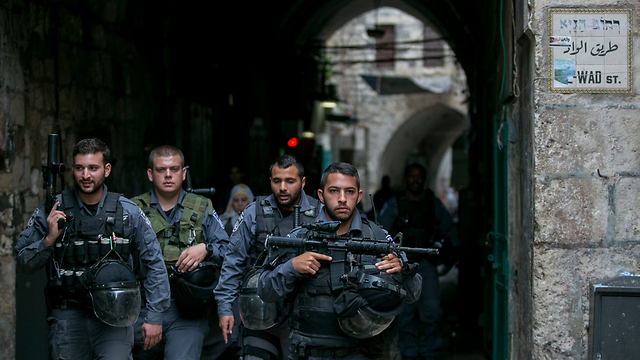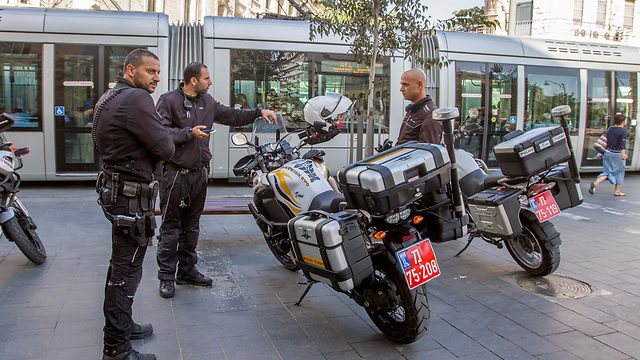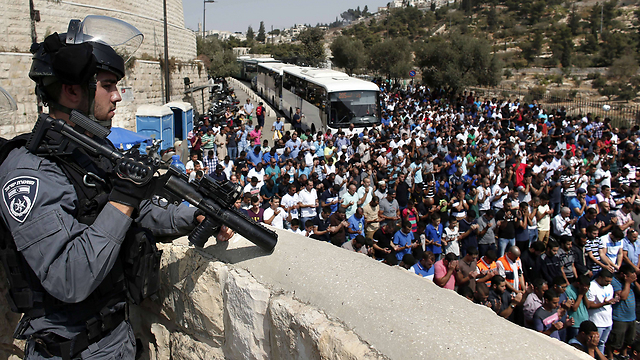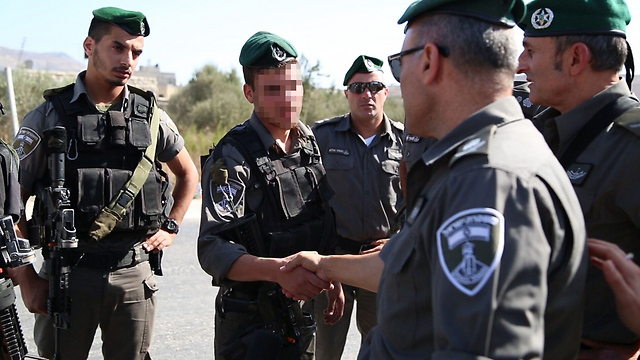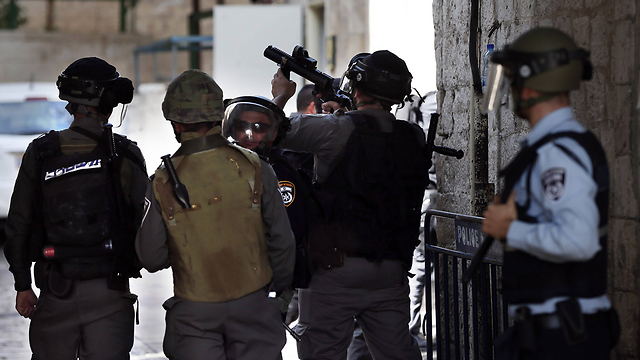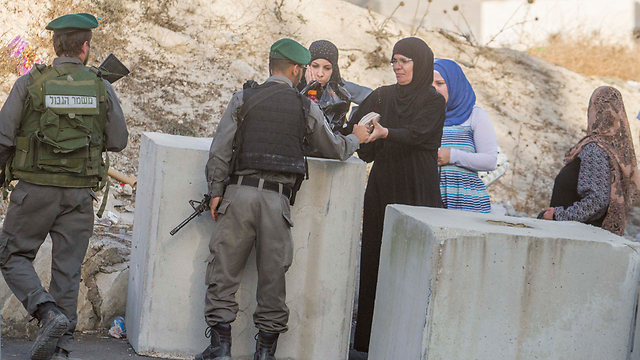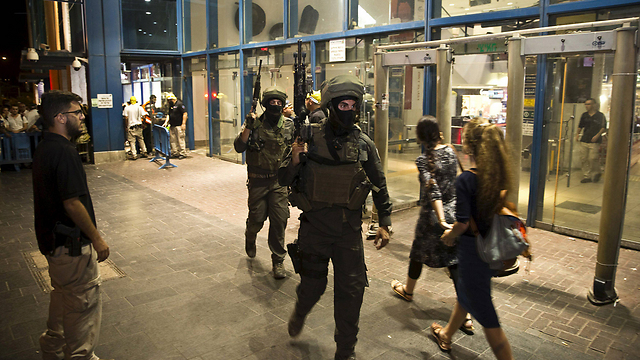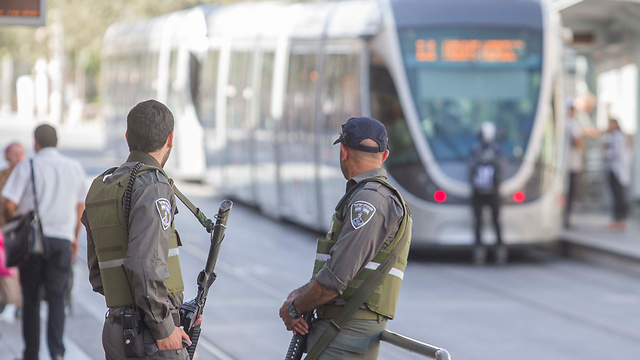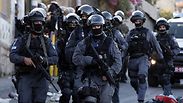
'In the midst of this storm, we don't forget our humanity'
The commander of the Border Police's Jerusalem District is trying to keep the sanity in the burning city, but his orders to his men are clear: Don't hesitate to shoot; Meanwhile on the Temple Mount, police commanders are trying to deal with the explosive situation; 'Every terrorist sees himself as the Guardian of al-Aqsa. It all starts and ends with the fear over the status quo.'
It was around 5pm when, all of a sudden, Brig.-Gen. Izhar Peled, the commander of the Border Police's Jerusalem District, shot out of his chair and flew out of his office. It was like a lightning that appears suddenly and without notice, and disappears just as fast. One moment Peled was sitting in front of us, talking about his fighters, who are spread out at every corner of the city; the complexity of the operations in East Jerusalem; and the current wave of terrorism raging on, which he refuses to call "an intifada," and all of a sudden the radio on his shoulder rumbles with reports from the scene of the terror attack at the central bus station on Jaffa Street. "This is Thunder 1," we could still hear him say before he disappeared down the hall. "I'm on my way there."
The Jerusalem headquarters of the Border Police is located on Highway 1, which separates the west and east parts of the city. It is a dull-looking command building, built around a relatively small exercise yard, standing with its back to the Sheikh Jarrah neighborhood.
On Wednesday, even before the attack at the central bus stop, Prime Minister Benjamin Netanyahu visited here. Waiting for him there were the most senior police officers in the district, and a representative sample of the forces and units that are currently operating on the Jerusalem streets, working to thwart and stop the terror attacks.
"I came here to thank each and every one of you working to prevent the knife-wielding terrorists, the teen terrorists," Netanyahu started, with that actually summarizing the bigger problem the police is currently dealing with.
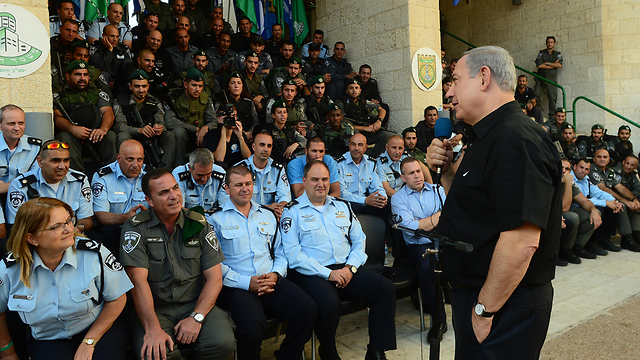
Peled, 54, the district commander, actually lives in one of the Gaza border communities. Last year, when his family was enduring mortar shells back home, he was dealing with the violent rioting in East Jerusalem that followed the kidnapping and murder of Palestinian teenager Mohammed Abu Khdeir. Now, he has much bigger problems.
He returns to his office on the first floor of the headquarters building only after making sure that things at the central bus station were under control. There he tells us that this wave of terror is led by the Facebook generation - young people from East Jerusalem who get all of their information, much like their peers all over the world, from social media.
Profiling the perpetrators of the recent wave of attacks, Peled says they're "young people who live in two worlds. On the one hand, they live online - everyone is on Facebok, updated, operating in the modern world. And on the other hand, they're also very much connected to the world they come from - to the culture and religion, even if they are not religious. They're exposed to videos and false propaganda, and to an atmosphere that has been hijacked by those who seek to incite.
"The fact most of them are young is not their only common attribute, they also all share the aspect of spontaneity. So far, we haven't found that the attackers we've encountered planned their attacks or received guidance. It could very well be that the two teenagers, aged 15 and 13 from Beit Hanina, who committed the attack in Pisgat Ze'ev on Monday afternoon, were playing soccer with friends just a few hours before and all of a sudden decided to grab a knife and act. We do arrive at the home of every attacker shortly after we realize who they are and where they live, and in quite a few of the cases we found that the parents were very surprised of what their child had done. It's only after the attack that the parents find themselves supporting the terror act and the ideology behind it, and welcoming the attack.
"And if I look at the bigger picture, then I see the Temple Mount at the backdrop of all of these incidents. That is the catalyst to the violence, behind which are extremists who promote false propaganda about changing the status quo. There is no change in the status quo on the Temple Mount, and I say this with authority."
Face-to-face fighting
To deal with this wave of violence, the Israel Police and Border Police flooded the city with massive forces. Some 2,100 Border Police fighters are deployed across the capital during normal times. This week, Peled received reinforcements of 700 reservists, and 400 more are supposed to join them in the coming days. Along with the district's police forces, under which the Border Police operates, and the reinforcements the Israel Police sent to Jerusalem from all over the country, there are about 4,000 policemen and troops operating in the city at any given moment - each of whom could be a target for terrorists.
Videos that surface online after each of these attacks show that the terrorists had the element of surprise, but also the heightened vigilance of the troops. A video of the Monday attack at the Lion's Gate shows Border Policemen approaching a suspicious man, who surprises them by drawing out a knife and stabbing one of them. The other policeman takes a step back and immediately responds by opening fire at the terrorist.
"The fighting is, in most cases, face-to-face," Peled says. "The attacker comes close and sticks a knife in, or suddenly veers the vehicle and hits a bus stop. We learn from each attack and the fighters implement the lessons. We learn how to recognize the signs. When the terrorist from the Lion's Gate approached the fighters, they noticed one of his hands was in his pocket. One of the fighters told his friend 'Keep an eye out, I'm going to check him out,' and when he approached the terrorist started stabbing him. This vigilance quite possibly stopped the terrorist from entering the Old City and harming civilians.
"Our commanders constantly instill in the fighters the need to be alert and vigilant, but when you're in the midst of such a terrible wave of violence, you're really wound up as it is without having to be constantly reminded. It's ingrained in every fighter, as an instinct. You're attuned to your surroundings a lot more than usual, constantly in fighting mode."
This vigilance and quick response often lead to shooting that kills the terrorists, even in instances when the fighters could've just hurt the terrorist in order to neutralize him. Is there an order to shoot to kill?
"The high level of vigilance has nothing to do with the outcome of the shooting. This vigilance is meant to stop the next attack, and if there is an attack - then it's meant to allow fast neutralization of the terrorist. The way you neutralize or prevent the attack, or stop it from continuing, comes from the situation. The response to those who try to harm civilians or security forces should be sharp and clear: Immediate shooting, without hesitation. Those are my orders to the fighters. When your life, or the life of those around you, is in danger - immediately neutralize the terrorist.
"Even then, as soon as the danger has passed and the terrorist is only wounded, our fighters give him first aid and save his life.
"A month ago we had a terrorist who threw an explosive device at us at Rachel's Tomb, and he was shot in the leg by our fighters. He fell to the ground and when our fighters saw he no longer posed a threat, they treated him. They even evacuated him to the hospital. So there is no dilemma - when lives are not in danger, the fighters don't shoot, period.
"You have to understand these are not incidents happening in a controlled environment. All of this is happening on the streets, and it's happening fast. Police officers and Border Police fighters become a human shield out on the streets. They are the immediate target. They are constantly in danger, around the clock, from ambushes by Molotov cocktail- and stone-throwers, knife-wielding attackers, rioters launching firecrackers and throwing makeshift bombs directly at them. They have the backing of the Israel Police and Border Police command to defend themselves, and if that means shooting - then by shooting.
"We have over 70 policemen and fighters wounded at different levels. Some of them are still hospitalized. I make sure, even in the midst of the intensive periods, to find the time to get to the hospitals and visit them, to tell them how proud I am of them. The policeman who was wounded at the Damascus Gate on Saturday is going into surgery today. He's still in serious condition. We have officers wounded from stone-throwing. Two fighters suffered serious burns to their faces after being hit by a Molotov cocktail. And in the midst of all of this, we don't forget our humanity.
"Last week, we had rioting in Shuafat, and out of the commotion came a vehicle transporting a woman in labor. One of the teams, which was under a heavy barrage of stones, got into their jeep and cleared the way for the woman all the way to the hospital. The woman in labor came from the very same place as a terrorist who fired at our fighters last Friday. He was shot and killed. We don't lack for stories about the complexity of life in the field. When we came to the home of the terrorist from Jabel Mukaber, who committed the attack in front of the Israel Police headquarters, we ran into violent rioting. But all of a sudden, in the corner of my eye, I see a fighter leading an elderly man by the hand and helping him up a steep staircase. This image really demonstrated to me the complexity and humanity of our fighters. We have a lot to be proud of."
Until the first stone is thrown
We started our tour of Jerusalem on Tuesday, when one attack came on the heels of another. A stabbing and shooting on a bus in East Talpiot, a vehicular attack in Geula, two other stabbings in Ra'anana, and one in Kiryat Ata - that turned out to be a "mistaken identity" - a Jew stabbed another Jew because he thought the latter was an Arab.
In the midst of the whirl of reports flooding the police scanner were Commander Doron Turgeman, who commands the troops at the City of David, and Chief Superintendent Ofer Ganon, the commander of the unit securing the holy places - the people who are entrusted with the most sensitive spot in the entire Israeli-Palestinian conflict. The two were looking at the big monitor in Ganon's office, keeping an eye on the Temple Mount. The streets outside the Old City were raging, but all was quiet on the Temple Mount.
The Temple Mount has nine access gates, and they are opened every day. The Moroccans' Gate is the one security forces use when they have to enter the Temple Mount to disperse rioting. Other than Israeli security forces, the gate is also used by visitors who are not Muslim, Jews, and tourists. Visits are allowed twice a day - from 7:30am to 11am, and from 1:30pm to 2:30pm. Muslims, meanwhile, can go on the Temple Mount at any hour of the day through the gates controlled by the waqf. The Israel Police has the key to the Moroccans' Gate, while the waqf has the keys to the other eight gates.
On Tuesday, as terrorists were running amuck through the streets of the country, 26 Jews and 532 tourists visited the Temple Mount, similar numbers to what the Temple Mount usually sees. The numbers change only on holidays. Over the past year, some 10,000 Jews went on the Temple Mount, despite a strict ban by the Chief Rabbinate and rabbis of the ultra-Orthodox and Orthodox sectors.
"Our main challenge is to maintain calm, maintain the status quo, that what used to be, continues," says Turgeman, who commands the unit in charge of the holy places. "That is why even on a day like this, it's very important to continue business as usual on the mountain. The tourists can wander around unsupervised, and we only accompany the Jews to make sure they don't break the rules, which are very clear: Praying, or any other act of religious worship, is not allowed.
"It's important to stress that we have an ongoing, daily dialogue with the waqf, even in the tensest of times. They have administrators and we're in contact with them. When we decide to limit the age of those allowed on the Temple Mount, we inform them. When there is rioting, we ask the waqf's representatives to disperse the rioters. We only come in when it's clear there is no choice, when there is a danger of stones being thrown into the Western Wall plaza. The uninterrupted freedom of worship, which we protect, is granted to all parties. So if we go into the Temple Mount to disperse rioters, it's only to prevent them from harming the worshipers at the Western Wall or on the Temple Mount. A Molotov cocktail thrown on the Temple Mount could hit a Muslim too, not just Jews."
The Temple Mount opens at 4:15am for dawn prayers and closes at around 9:15pm, after night prayers. The policemen stationed there sweep the area to make sure there are no worshipers or visitors left on the Temple Mount, and then leave the site to the waqf's guards. At around 8am, with Muslim worshipers already on the Temple Mount, hundreds of school children arrive. There are three Muslim schools on the Temple Mount - two for boys and one for girls. Other than the mosques and the schools, the 144 dunam of the Temple Mount also house administrative buildings, a clinic and a fire truck. Some 30 Arab families live on the walls of the Temple Mount, meaning their home is built outside the gates, but the front of the house is inside the Temple Mount complex. They enter and leave their homes from within the Temple Mount.
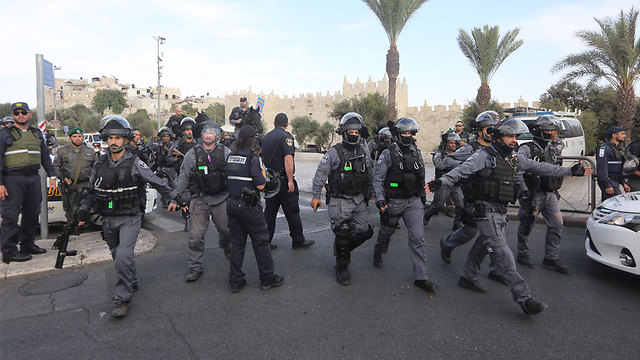
So the responsibility on Turgeman and Ganon's shoulders is massive. Each decision they make about the Temple Mount could be monumental. The problem is that not everything is under their control. Both among the Muslims and among the Jews, there are those who incite and fan the flames the area. There are some 30 Jews who belong to the extremist right wing, and several dozens of Muslims, who belong to the Islamic Movement and other Islamic groups on the list of those barred from the Temple Mount. Last week, the prime minister added public officials, members of Knesset and ministers - both Jewish and Arab - to this list. The effort to lower the flames around and within the city is now the main objective.
Ganon says the status quo on the mountain is uncompromisingly protected and maintained. Turgeman agrees: "Most of my attention as the commander of this area is directed at the Temple Mount and the status quo, which is strictly maintained." They both insist there has been no violation of the status quo, which was set in 1967, but the Muslims say otherwise.
"Some Muslim groups go on websites affiliated with groups that advocate for Jewish prayer on the Temple Mount, and they see posts there about fictitious visits to the Temple Mount," Ganon explains. "They copy-paste it to their websites and call on everyone to come and protect the Temple Mount. They fan the flames, when in reality nothing of the sort is happening - Jews are not allowed into the Temple Mount to pray, and there's no chance such a thing will be allowed. Jews are allowed on the mountain only during visitation hours, and their visits are accompanied and supervised by us and the waqf's people. The smallest deviation from the rules leads to removal from the site, and if necessary, to banning as well."
But Jews were documented praying on the Temple Mount, and Muslims set up barricades all over the area.
Turgeman: "There's no two ways about it, Jews who pray on the Temple Mount during visitation hours are quickly removed from the complex. Those who cause provocation, even the smallest one, cannot stay on the Temple Mount. Those we identify as problematic individuals don't get to visit the Temple Mount again. They go on the banned list.
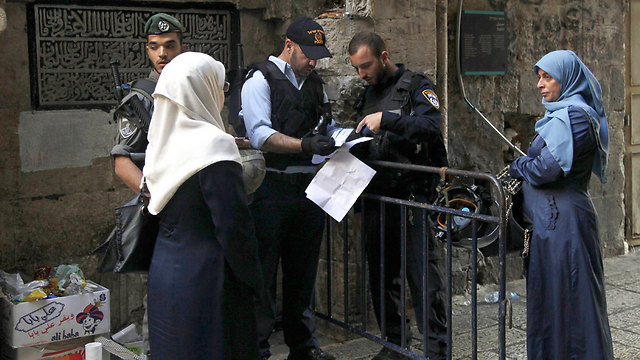
"We act decisively against Muslim rioting as well. If we notice preparations for a riot, or if a riot has already broken out, we turn to the waqf. We give them time to act, and at the same time we prepare to act at a discreet place, outside the Moroccans' Gate. It's only after the first stone is thrown that we act. Over the holidays, we've encountered heavy stone throwing, as well as Molotov cocktails and firecrackers aimed directly at us. But even when we act against the rioting, we continue visitations on the Temple Mount, the schools continue operating, and prayer continues undisturbed in mosques where no rioting occurs."
We left the holy places unit, headquartered not far from the entrance to the Western Wall, and headed for the Chain Gate, one of the gates to the Temple Mount. Turgeman and Ganon made sure we didn't get too close to the entrance. Tensions are running high as it is, there's no need to pour gasoline on the fire. "It all starts and ends with the status quo here," the area commander concludes. "After all, this place is now the reason attacks are committed. Every terrorist sees himself as the guardian of al-Aqsa. But as the commander of this place and the one responsible for enforcement and protecting the status quo, I tell you this with authority, and you can see it on the ground - there currently isn't and never was a change to the status quo."
'Walla, we're tired of this'
We set up a meeting with Brig.-Gen. Peled, the commander of the Border Police's Jerusalem District, on Wednesday afternoon. But before we could exchange a single word, he lept out of his seat and raced to the Damascus Gate, where a stabbing attack was thwarted. When he returned, he came back up to his office for a few minutes, but then left in a hurry again because of Netanyahu's visit. When we convened once more, he told us about the new measures the police is taking to minimize the scope of terror attacks.
On Tuesday night, the Security Cabinet authorized the police to set up a partial closure of the neighborhoods of East Jerusalem, based on situation assessments and developments of the situation on the ground.
"These are checkpoints, which we call 'open roadblocks,'" Peled explains. "Residents are allowed to enter and exit the neighborhoods, but we do a random check of the comings and goings. It's meant to minimize the potential of a terrorist coming out of that neighborhood."
If these "open roadblocks" don't do the trick, security forces will examine the possibility of setting up more permanent checkpoints. This kind of closure won't allow movement and will force the Arab residents to bypass the checkpoints in order to leave and return to their homes.
Another operation, dubbed "The Guardians of the Capital," focuses on securing Highway 1, which was also the border line that split Jerusalem before 1967. It includes patrols moving up and down the road, as well as surveillance units. This is an indication that the city might me united on paper, but on the ground it is divided.
"We have moved onto offensive operations inside the villages and neighborhoods," Peled says. "And we moved the flashpoints from the main roads to inside the villages. We've made over 300 arrests. The equation is simple: Get to every rioter, whether during clashes or afterwards. At night time - that's when the fighters come to arrest them. The aim is to increase interaction with the rioters. That means surveillance, ambushes, and special ops."
To that end, the police's counterterrorism unit spent the nights of the past week making arrests. The Jerusalem Border Police's undercover unit operates at flashpoints during clashes with rioters, going into the crowds and arresting rioters as soon as they throw a stone. The Palestinians are aware of the unit's operations and have posted a "How to identify undercover police" guide on Facebook last week. The post, which was written by a Palestinian website, instantly went viral.
"Upon identifying an undercover cop," the short guide instructs, "attack them with stones and knives."
Peled is not worried, however. "Our undercover officers are well trained and know how to handle complex situations and how to defend themselves. They operate in cooperation with other forces and will never be out in the field on their own. There will always be other troops nearby to quickly interfere. This unit creates deterrence. It can reach the very heart of the neighborhoods and villages without drawing any attention, find a suspect sitting outside his home, at a cafe or at a market store, pull him out and leave, sometimes without anyone else noticing."
In the early evening hours, Peled had a meeting on the technical details of the partial closure, and in the time we had left we went to an "open roadblock" stationed at the western entrance to Isawiya, at the bottom of the French Hill. In the darkness of the evening hours, we found a team of Border Police reservists, police officers from central Israel sent there for reinforcement, and the command post of Superintendent Or'ad Atar, the commander of the Border Police's Company 56. A massive truck with 12 blocks of concrete, 2.5 tons each, was blocking the road into Isawiya, and waiting for a crane to come and take the blocks off it. It stood there motionless, after the driver tried to drive backwards, but the engine could not take the heavy weight and steep slope. All he could do was wait for the crane, that was delayed on the way over.
The concrete blocks are supposed to create a slalom track for cars coming in and out of the village to go through. If anyone seems suspicious, they'll be asked for identification. Troops will also conduct a search of the vehicle and the passengers' belongings. Cars coming into the villages won't be searched, but in case of a terror attack - if the terrorist was able to escape, or if there is intelligence he was aided by collaborators who fled the scene - troops will start searching those coming into the village as well.
There, we meet Yusuf Mahssain, 40, a resident of Isawiya, who is looking gloomily at the truck stuck in the middle of the road, blocking his way home. "Walla, we're tired of this situation," he says. "It's clear this is going to be a bother and to affect all of the village's residents. It'll make people against you. No one came out of our village and did anything. The youth throw stones and bottles, but they do it all here."
A policeman who was standing nearby, listening in on the conversation, wanted to clarify: The terrorist who committed the Saturday morning attack on the Street of the Prophets, and wounded two elderly people, came from Isawiya.
"These are the measures we use to press them into stopping the attacks," Peled says when we meet again, later in the evening. "To make the residents condemn the attacks and reject them. The number of those actually involved in terror attacks is very small. The majority of the population in East Jerusalem wants to live and make a living with dignity. We don't want to hurt them. The roadblock is set up so we could conduct security checks.
"Our entire attention and activity is focused on the hard core of the leaders of the riots, and those who incite to terrorism against us. We have no interest in hurting the quiet population that is not a part of this wave of violence. But are we going to wake up to a new reality tomorrow morning? One of calm? This I can't say for sure. Calm doesn't just happen overnight. It requires persistence, determination, professionalism and vigilance - both from the troops and from civilians. I recommend that residents remain vigilant and alert, but at the same time stick to their daily routine. The city is flooded with security forces who are everywhere and their job is to restore calm to Jerusalem."










